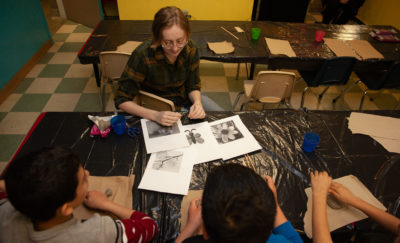- Program Overview
- Program Goals
- Skills and Knowledge You Will Gain From Childhood and Youth Studies
- Program Requirements
- Courses
- Minor Options
- Learning Opportunities
- Apply
Program Overview
The Childhood and Youth Studies program at Carleton, with its focus on youth as well as childhood, and its attention to critical intersectionality as well as children’s rights and youth activism, is the only program of its kind in Eastern Ontario. The newly updated program is designed to address the sustained growth of student demand over the last five years and reflect current trends in research about and with children and young people.It is a relatively new interdisciplinary field that spans multiple epistemologies and methodologies, and it is one of the most active and rapidly growing fields in academia today. Critical childhood and youth studies represents a departure from traditional psychological and educational research “on” children, which limits the agency, voice, and participation of young people. Contemporary critical childhood and youth scholars believe that children themselves are the best informants of their own lives and therefore look at children’s own cultures, meanings and the ways in which they attempt to change their lives and the lives of adults around them. Childhood and Youth Studies courses are designed to be engaging and to reflect our world and society today, providing a holistic context that students will take with them into their future endeavors. In order to prepare graduates for a wide range of careers, the program focuses on skills in critical thinking, reading, and writing, social and historical analysis, and research.

Program Goals
The principal goal of the Childhood and Youth Studies program is to provide a critical interdisciplinary educational experience designed to prepare students for a wide range of careers that involve work with and/or for children and youth. The program structure reflects the belief that understanding the relationship between childhood, youth, culture, child welfare and individual rights of children as well as the economic, social, and political conditions that influence young people’s lives. Childhood and Youth Studies majors will acquire the analytic skills necessary to work effectively with children and youth, gain an understanding of the complex contexts of childhood and adolescence throughout history and today as they will develop a commitment to the welfare of children and youth in Canada and across the world.

Skills and Knowledge You Will Gain From Childhood and Youth Studies
- Explore the ways that societal structures of power, privilege, and oppression shape the identities of children and youth.
- Interrogate normative assumptions about children, childhood, and adolescence.
Collect and analyze relevant information about children and youth from a variety of interdisciplinary sources and fields. - Present results from research in childhood and youth studies, both in writing and orally, to promote evidence-based knowledge to policy makers, service providers, and general audiences.
- Communicate effectively, intelligently and constructively during discussions on topics relevant to childhood and youth studies.
- Identify strategies for ethical and human rights implications of working with children and youth.
- Write non-academic reports, policy briefs, pamphlets and posters to communicate about specific issues.
- Critically review and evaluate strengths, weaknesses and limitations of a variety of childhood and youth research methodologies.
- Conduct a self-directed research study utilizing appropriate research methods to effectively investigate a special topic related to Childhood and Youth Studies.
Program Requirements
The link below is the Carleton University Childhood and Youth Studies Undergraduate Calendar which is a useful resource. The Undergraduate Calendar contains details on the 2 different program options within Childhood and Youth Studies (Bachelor of Arts in Childhood and Youth Studies General and Bachelor of Arts in Childhood and Youth Studies Honours), Courses, Regulations, and Admission information.
https://calendar.carleton.ca/undergrad/undergradprograms/childhoodandyouthstudies/
Courses
Program Courses: https://carleton.ca/iis/program-courses/
Minor Options
Students in the Childhood and Youth Studies Program often decide to add a minor to their degree. Minors are opportunities for students to specialize in another field while completing their Bachelor’s degree in Childhood and Youth Studies. Many students select minors that interest them or will help them in their future professions.
Some common minors in the Childhood and Youth Studies program are:
- Psychology
- French (or a second language)
- Women’s and Gender Studies
- Disability Studies
- Indigenous Studies
- Sociology & Anthropology
Learning Opportunities
The Childhood and Youth Studies program has several potential learning opportunities both inside and outside the classroom which enables students to use their knowledge and skills learned throughout the program in various settings.
Click the following links to learn more about the many great learning opportunities that are available to Childhood and Youth Studies students:
- Practicum
- Honours Thesis
- Internship-Carleton University Research Experience for Undergraduate Students (I-CUREUS)
- Students as Partners Program (SaPP)
- Faculty of Arts and Social Sciences Research Internship
Apply
Childhood and Youth Studies is an incredible program for those who are interested in working with children and/or youth. If you are interested, please apply to this one of a kind program that will give you the knowledge and experience that will help you succeed in your future career.
For all information on how to apply please visit https://admissions.carleton.ca/ or contact the admissions department at admissions@carleton.ca
